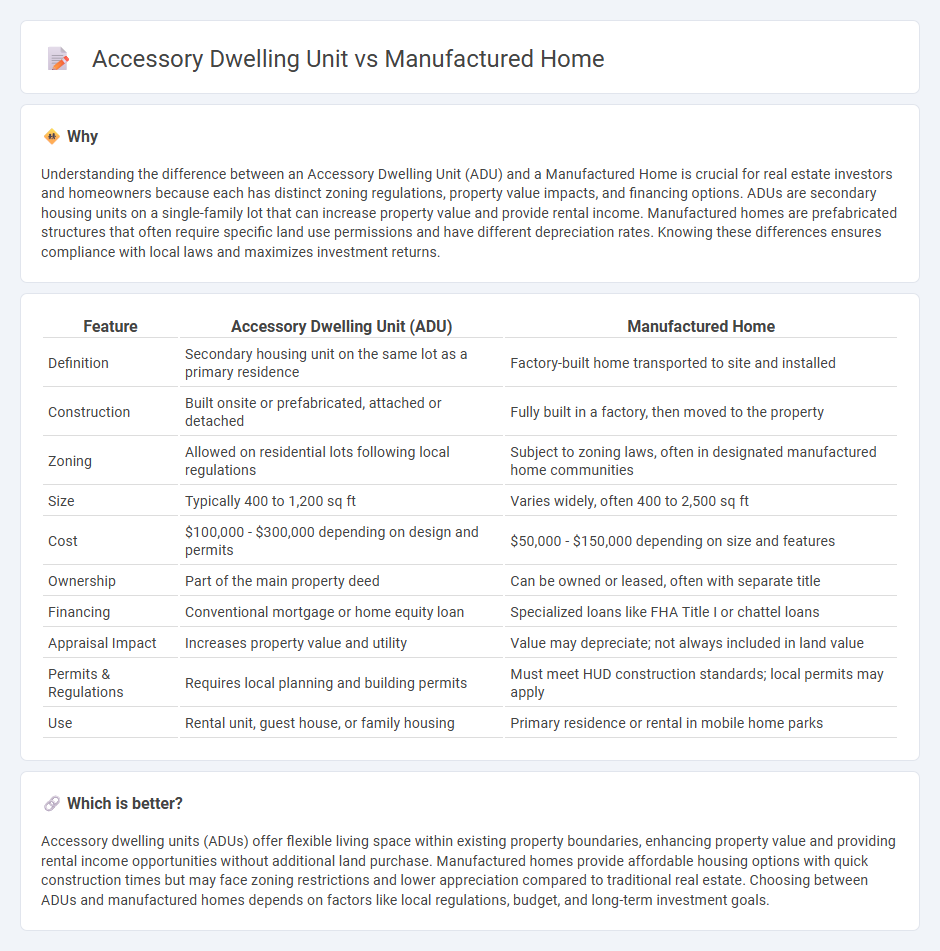
Accessory dwelling units (ADUs) are secondary housing units located on the same property as a primary residence, often used to increase living space or generate rental income. Manufactured homes are factory-built residences transported to a site and installed, offering affordability and flexibility in location compared to traditional homes. Explore the differences in cost, regulations, and benefits to determine which option suits your real estate needs.
Why it is important
Understanding the difference between an Accessory Dwelling Unit (ADU) and a Manufactured Home is crucial for real estate investors and homeowners because each has distinct zoning regulations, property value impacts, and financing options. ADUs are secondary housing units on a single-family lot that can increase property value and provide rental income. Manufactured homes are prefabricated structures that often require specific land use permissions and have different depreciation rates. Knowing these differences ensures compliance with local laws and maximizes investment returns.
Comparison Table
| Feature | Accessory Dwelling Unit (ADU) | Manufactured Home |
|---|---|---|
| Definition | Secondary housing unit on the same lot as a primary residence | Factory-built home transported to site and installed |
| Construction | Built onsite or prefabricated, attached or detached | Fully built in a factory, then moved to the property |
| Zoning | Allowed on residential lots following local regulations | Subject to zoning laws, often in designated manufactured home communities |
| Size | Typically 400 to 1,200 sq ft | Varies widely, often 400 to 2,500 sq ft |
| Cost | $100,000 - $300,000 depending on design and permits | $50,000 - $150,000 depending on size and features |
| Ownership | Part of the main property deed | Can be owned or leased, often with separate title |
| Financing | Conventional mortgage or home equity loan | Specialized loans like FHA Title I or chattel loans |
| Appraisal Impact | Increases property value and utility | Value may depreciate; not always included in land value |
| Permits & Regulations | Requires local planning and building permits | Must meet HUD construction standards; local permits may apply |
| Use | Rental unit, guest house, or family housing | Primary residence or rental in mobile home parks |
Which is better?
Accessory dwelling units (ADUs) offer flexible living space within existing property boundaries, enhancing property value and providing rental income opportunities without additional land purchase. Manufactured homes provide affordable housing options with quick construction times but may face zoning restrictions and lower appreciation compared to traditional real estate. Choosing between ADUs and manufactured homes depends on factors like local regulations, budget, and long-term investment goals.
Connection
Accessory dwelling units (ADUs) and manufactured homes both provide affordable, flexible housing solutions that maximize property use and increase living space on a single lot. Manufactured homes can serve as ADUs, offering a cost-effective, quick-to-install alternative to traditional construction while complying with zoning regulations. This synergy enhances urban density and supports housing diversity without extensive redevelopment.
Key Terms
Permanent Foundation
Permanent foundations provide manufactured homes with enhanced stability and compliance with state building codes, ensuring long-term durability and increased property value. Accessory dwelling units (ADUs) often utilize permanent foundations to meet local zoning requirements and facilitate seamless integration with existing structures. Explore detailed comparisons and regulations to understand the impact of permanent foundations on both housing options.
Zoning Regulations
Zoning regulations for manufactured homes often differ significantly from those for accessory dwelling units (ADUs), impacting placement, size, and utility connections on a property. Manufactured homes typically face stricter zoning restrictions, requiring specific zoning districts and minimum lot sizes, whereas ADUs are more widely accepted in residential zones with fewer limitations. Explore detailed zoning codes and local policies to understand how these regulations influence your housing options.
Property Title
Manufactured homes and accessory dwelling units (ADUs) differ significantly in property title implications; manufactured homes are often considered personal property unless permanently affixed to a foundation, converting them to real estate. ADUs, built on the same parcel as the main dwelling, are legally integrated into the property title, offering seamless ownership and financing options. Explore the detailed distinctions in property title handling for both to make informed decisions.
Source and External Links
Manufactured housing - Wikipedia - Manufactured homes are prefabricated houses built in factories, transported to sites, and constructed on a permanent chassis, regulated federally in the U.S. by HUD standards since 1976 distinguishing them from previous mobile homes.
Manufactured Homes | Compare Floor Plans & Builders - This site offers a large selection of manufactured homes, including floor plans and financing options, enabling buyers to browse new and used homes nationwide with customizable features.
Manufactured Housing (MH) | DHCD - The Virginia Department of Housing supports programs to preserve affordable manufactured home communities through resident and nonprofit ownership, promoting long-term housing affordability and stability.
 dowidth.com
dowidth.com